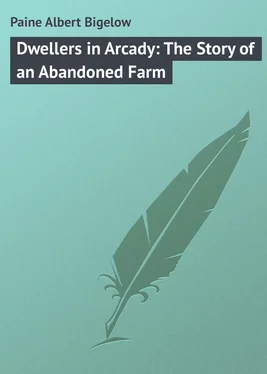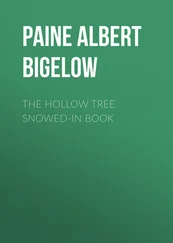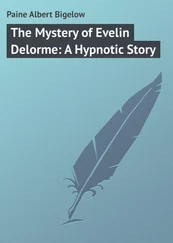Albert Paine - Dwellers in Arcady - The Story of an Abandoned Farm
Здесь есть возможность читать онлайн «Albert Paine - Dwellers in Arcady - The Story of an Abandoned Farm» — ознакомительный отрывок электронной книги совершенно бесплатно, а после прочтения отрывка купить полную версию. В некоторых случаях можно слушать аудио, скачать через торрент в формате fb2 и присутствует краткое содержание. Жанр: foreign_prose, на английском языке. Описание произведения, (предисловие) а так же отзывы посетителей доступны на портале библиотеки ЛибКат.
- Название:Dwellers in Arcady: The Story of an Abandoned Farm
- Автор:
- Жанр:
- Год:неизвестен
- ISBN:нет данных
- Рейтинг книги:3 / 5. Голосов: 1
-
Избранное:Добавить в избранное
- Отзывы:
-
Ваша оценка:
- 60
- 1
- 2
- 3
- 4
- 5
Dwellers in Arcady: The Story of an Abandoned Farm: краткое содержание, описание и аннотация
Предлагаем к чтению аннотацию, описание, краткое содержание или предисловие (зависит от того, что написал сам автор книги «Dwellers in Arcady: The Story of an Abandoned Farm»). Если вы не нашли необходимую информацию о книге — напишите в комментариях, мы постараемся отыскать её.
Dwellers in Arcady: The Story of an Abandoned Farm — читать онлайн ознакомительный отрывок
Ниже представлен текст книги, разбитый по страницам. Система сохранения места последней прочитанной страницы, позволяет с удобством читать онлайн бесплатно книгу «Dwellers in Arcady: The Story of an Abandoned Farm», без необходимости каждый раз заново искать на чём Вы остановились. Поставьте закладку, и сможете в любой момент перейти на страницу, на которой закончили чтение.
Интервал:
Закладка:
Paine Albert Bigelow
Dwellers in Arcady: The Story of an Abandoned Farm
CHAPTER ONE
I
All my life I had dreamed of owning a brook
Just below the brow of the hill one of the traces broke (it was in the horse-and-wagon days of a dozen years or so ago), and, if our driver had not been a prompt man our adventure might have come to grief when it was scarcely begun. As it was, we climbed on foot to the top, and waited while he went into a poor old wreck of a house to borrow a string for repairs.
We wondered if the house we were going to see would be like this one. It was of no special design and it had never had a period. It was just a house, built out of some one's urgent need and a lean purse. In the fifty years or so of its existence it had warped and lurched and become sway-backed and old – oh, so old and dilapidated – without becoming in the least antique, but just dismal and disreputable – a veritable pariah of architecture. We thought this too bad, for the situation, with its view down a little valley and in the distance the hazy hills, was the sort of thing that, common as it is in Connecticut, never loses its charm. Never mind, we said, perhaps "our house" would have a view, too.
But then our trace was mended and we went along – happily, for it was sunny weather and summer-time, and, though parents of a family of three, we were still young enough to find pleasure in novelty and a surprise at every turn. Our driver was not a communicative spirit, but we drew from him that a good many houses were empty in this part – "people dead or gone away, and city folks not begun to come yet" – he didn't know why, for it was handy enough to town – sixty miles by train – and a nice-enough country, and healthy – just overlooked, he guessed.
We agreed readily with this view; we were passing, just then, along a deep gorge that had a romantic, even dangerous, aspect; we descended to a pretty valley by a road so crooked that twice it nearly crossed itself; we followed up a clear, foaming little river to a place where there was a mill and a waterfall, also an old-fashioned white house surrounded by trees. Just there we crossed a bridge and our driver pulled up.
"The man you came to see lives here," he said. "The house is ahead, up the next hill."
"The man" must have seen us coming, for the door opened and he came through the trees, a youngish, capable-looking person who said he was the same to whom we had written – that is to say, Westbury – William C. Westbury, of Brook Ridge, Fairfield County.
Had we suspected then how large a part of our daily economies William C. Westbury was soon to become we should have given him a closer inspection. However, he did not devote himself to us. He appeared to be on terms of old acquaintance with our driver, climbed into the front seat beside him, and lost himself in news from the outlying districts. The telephone had not then reached the countryside, and our driver brought the latest bulletins. The death of a horse in Little Boston, the burning of a barn in Sanfordtown, the elopement of an otherwise estimable lady with a peddler, marked the beginning of our intimacy with the affairs of Brook Ridge.
The hill was steep, and in the open field at one side a little cascade leaped and glistened as it went racing to the river below.
"That's the brook that runs through your farm," Mr. Westbury said, quite casually, in the midst of his interchanges with the driver.
"Our farm!" I felt a distinct thrill. And a brook on it! All my life I had dreamed of owning a brook.
"Any trout in it?" I ventured, trying to be calm.
"Best trout-brook in the township. Ain't it, Ed?" – to the driver.
"Has that name," Ed assented, nodding. "I never fish, myself, but I've seen some good ones they said come out of it."
We were up the hill by this time, and Mr. Westbury waved his hand to a sloping meadow at the left.
"That's one of the fields. Over there on the right is some of your timber, and up the hill yonder is the rest of it. Thirty-one acres, more or less. The brook runs through all of it – crosses the road yonder where you see that bridge."
I could feel my pulse getting quicker. There was no widely extended view, but there was a snug coziness about these neighborly meadows and wooded slopes, with the brook winding between; this friendly road with its ancient stone walls, all but concealed now by a mass of ferns or brake on one side, and on the other by a tangle of tall grass, goldenrod, purple-plumed Joe Pye weed, wild grape with big mellowing clusters, wild clematis in full bloom. New England in summer-time! What other land is like it? Our brook, our farm, here in the land of our fathers! There were a warmth, a glow, a poetry in the thought that cannot be put down in words – something to us new and wonderful, yet as old as human wandering and return.
But then all at once we were pulling up abreast of two massive maple-trees and some stone steps.
"And here is your house," said William C. Westbury.
II
Ghosts like good architecture
I believe I cannot quite give to-day my first impression of the house. In the years that have followed it has blended into so many other impressions that I could never be sure I was getting the right one. I had better confine myself to its physical appearance and what was perhaps a reflex impression – say, number two.
One glance was enough to show that it was all that the other old house was not. It did not sag, or lurch, or do any of those disreputable things. It stood up as straight and was as firm on its foundations as on the day when its last hand-wrought nail had been driven home, a century or so before. No mistaking its period or architecture – it was the long-roofed salt-box type, the first Connecticut habitation that followed the pioneer cabin; its vast central chimney had held it unshaken during the long generations of sun and storm.
Not that it was intact – oh, by no means. Its wide weather-boards were broken and falling; the red paint they had once known had become a mere memory, its shingles were moss-grown and curling, the grass was uncut. The weeds about the entrances and rotting well-curb grew tall and dank; the appearance of things in general was far from gay. Clouds had overcast the sky, and on that dull afternoon a sort of still deadliness hung about the premises. No cheap, common house can be a haunted house. Ghosts like good architecture, especially when it has become pretty antique, and they have a passion for neglected door-yards. The place lacked nothing that I could see to make it attractive to even the most fastidious wandering wraith. As I say, I think this was not my first impression, but certainly it was about the next one, and I could see by her face that it was Elizabeth's.
"Place wants trimming up," said Mr. Westbury, producing a big brass key, "and the house needs some work on it, but the frame is as sound as ever it was. Been standing there going on two hundred years – hewn oak and hard as iron. We'll go inside."
We climbed down rather silently. I felt a tendency to step softly, for fear of waking something. The big key fitted the back door, and we followed Mr. Westbury. He told us, as we entered, that the place belonged to his wife and her sister – that they had been born there; also, their father, their grandmother, and their great-grandfather, which was as far back as they knew, though the house had always been in the family. Through a little hallway we entered a square room of considerable size. It had doors opening into two smaller rooms, and to one much larger – long and low, so low that, being a tall person, my hair brushed the plaster. Just in the corner where we entered there was an astonishingly big fireplace to which Mr. Westbury waved a sort of salute.
Читать дальшеИнтервал:
Закладка:
Похожие книги на «Dwellers in Arcady: The Story of an Abandoned Farm»
Представляем Вашему вниманию похожие книги на «Dwellers in Arcady: The Story of an Abandoned Farm» списком для выбора. Мы отобрали схожую по названию и смыслу литературу в надежде предоставить читателям больше вариантов отыскать новые, интересные, ещё непрочитанные произведения.
Обсуждение, отзывы о книге «Dwellers in Arcady: The Story of an Abandoned Farm» и просто собственные мнения читателей. Оставьте ваши комментарии, напишите, что Вы думаете о произведении, его смысле или главных героях. Укажите что конкретно понравилось, а что нет, и почему Вы так считаете.












